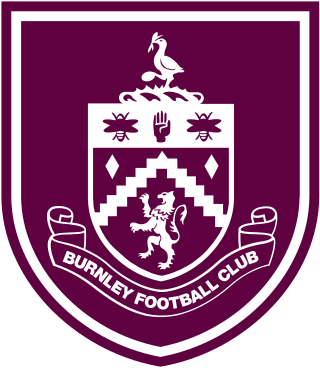
Burnley Football Club is a football club in Burnley, Lancashire, England, that competes in the Premier League, the first tier of English football. Founded in 1882, the club was one of the first to become professional and subsequently put pressure on the Football Association to permit payments to players. The club entered the FA Cup for the first time in 1885–86 and was one of the 12 founder members of the Football League in 1888–89. From the 1950s until the 1970s, under chairman Bob Lord, the club became renowned for its youth policy and scouting system, and was one of the first to set up a purpose-built training ground.

Turf Moor is an association football stadium in Burnley, Lancashire, England, which has been the home of Burnley Football Club since 1883. This unbroken service makes Turf Moor the second-longest continuously used ground in English professional football. The stadium is situated on Harry Potts Way, named after the manager who won the 1959–60 First Division with the club, and has a capacity of 21,944.
Henry Bradshaw was an English football manager.

Owen Columba Coyle is a professional football manager and former player who is currently the head coach of Indian Super League club Chennaiyin. He played as a striker for several clubs in England and Scotland, and made one appearance for the Republic of Ireland national team.

Graham Alexander is a professional football coach and former player who manages Bradford City. In a lengthy playing career, Alexander represented Scunthorpe United, Luton Town, Preston North End and Burnley. He also made 40 international appearances for Scotland.

Jack Frank Porteous Cork is an English professional footballer who plays as a defensive midfielder for and captains Premier League club Burnley. He played for the Great Britain Olympic team at the 2012 Summer Olympics.

The 1914 FA Cup final was an association football match between Burnley and Liverpool on 25 April 1914 at Crystal Palace, London. It was the final match of the 1913–14 FA Cup, the 43rd season of the country's primary cup competition, the FA Cup. Both teams were appearing in their first FA Cup final. Burnley and Liverpool entered the competition in the first round and progressed through five rounds to reach the final, both playing seven matches including two replays. Burnley had eliminated four clubs from the Football League First Division—the first tier of English football—en route to the final.

Sean Mark Dyche is an English professional football manager and former player who is the manager of Premier League club Everton.

Walter Abbott was an English professional footballer who scored 104 goals from 391 games in the Football League playing for Small Heath, Everton and Burnley. He was capped once for the England national team.

Alexander Leake was an English professional footballer who won five caps for his country and made 407 appearances in the Football League playing as a half back for Small Heath, Aston Villa and Burnley. After retiring from playing he took up coaching, both with professional clubs and at school level. He was a cousin of fellow Small Heath and England forward Jimmy Windridge.

Bertram Clewley Freeman was an English footballer. He played as a centre forward for clubs Woolwich Arsenal, Everton, Burnley and Wigan Borough. Freeman was one of the most prolific goal-scorers of his time, winning one First Division and two Second Division Golden Boots. He was also capped at the senior level for England.
William John Hillman was an English football goalkeeper who played for Burnley, Everton, Dundee, Manchester City and Millwall.
Jonathon Harry "Clem" Beddow was an English footballer. His regular position was as a forward. He was born in Burton upon Trent, Staffordshire. He played for Trent Rovers, Burton United, Manchester United and Burnley.

Fred Barron was an English professional footballer who played primarily as a wing half. He made exactly 400 Football League appearances in thirteen seasons with Burnley.
Arthur A. Bell was an English footballer who played as an inside forward. He started his career with Burnley Belvedere before joining Football League side Burnley in 1902. Over the next seven years, Bell made 101 league appearances and scored 28 goals for the Lancashire club. During his career, he won three caps for the England national amateur football team. An architect by trade, Bell also played as an amateur cricketer for Burnley Cricket Club for 20 years, during which time he won five Lancashire League championships. He was selected to represent the Lancashire Second XI on three occasions.
William Hutchinson was an English professional footballer who played as an inside forward. He played for Alston before joining Football League Second Division side Burnley in August 1904. He played his only senior match for Burnley on 10 September 1904 in the 0–4 defeat away at Bolton Wanderers. Hutchinson left the club in 1904, and his whereabouts thereafter are untraced.
Peter Neilson Robertson was a Scottish footballer.
Wilfred Lancaster was an English professional association footballer who played as an outside forward. Born in Backbarrow, Lancashire, he was playing for the Dick, Kerr's company team when he was signed by Football League First Division side Burnley in December 1924.
Burnley Football Club is an English professional association football club based in Burnley, Lancashire. It was founded on 18 May 1882 by members of rugby club Burnley Rovers, who voted for a change from rugby to association football. The suffix "Rovers" was dropped in the following days. Burnley became professional in 1883—one of the first to do so—putting pressure on the Football Association (FA) to permit payments to players. In 1885, the FA legalised professionalism, so the team entered the FA Cup for the first time in 1885–86, and were one of the twelve founder members of the Football League in 1888–89.











